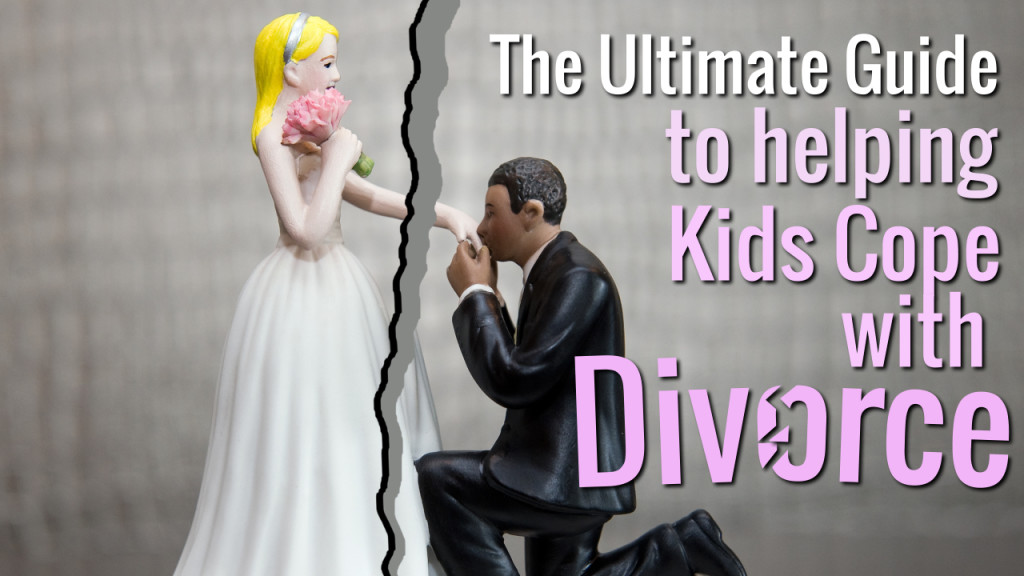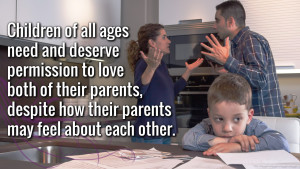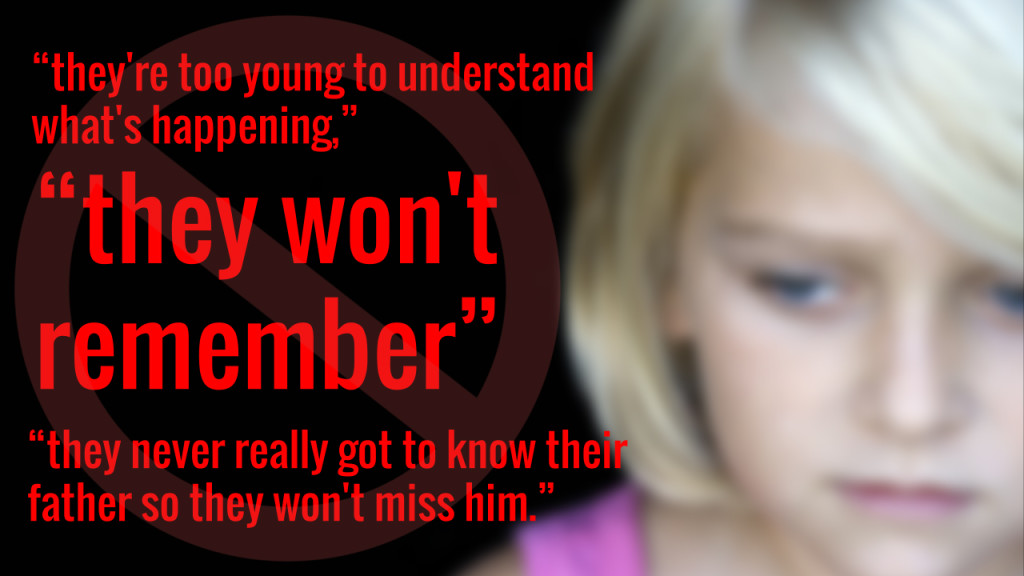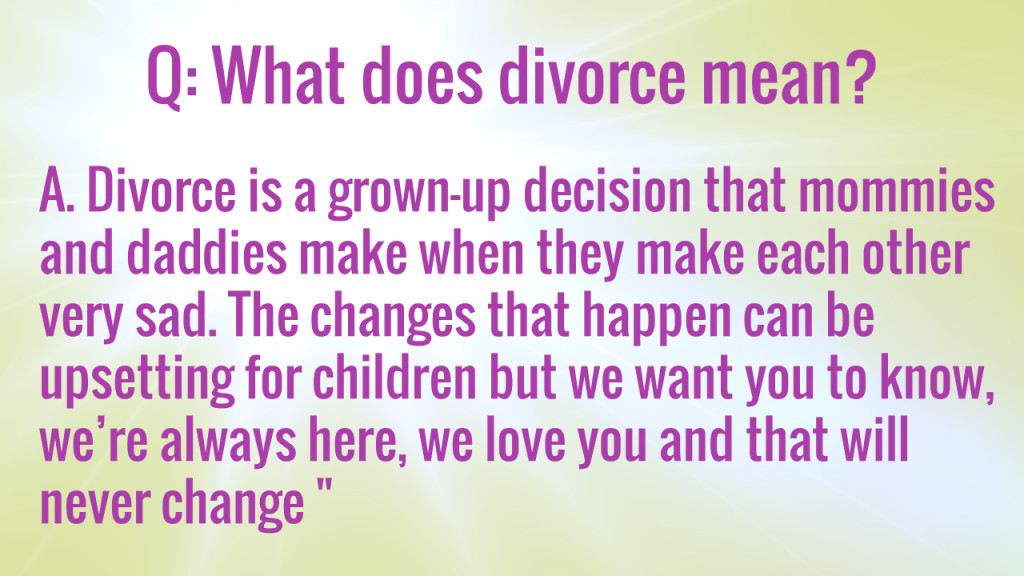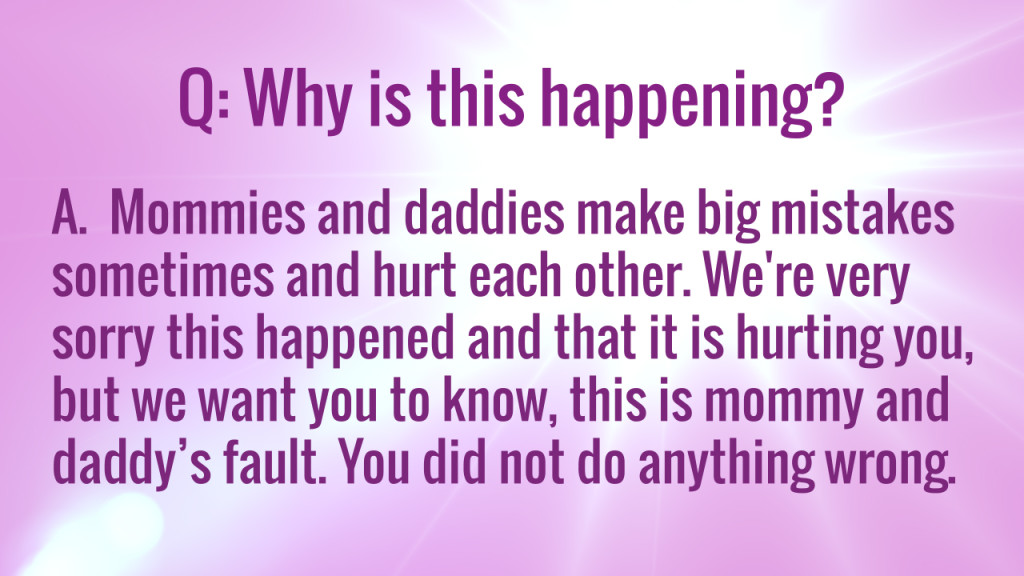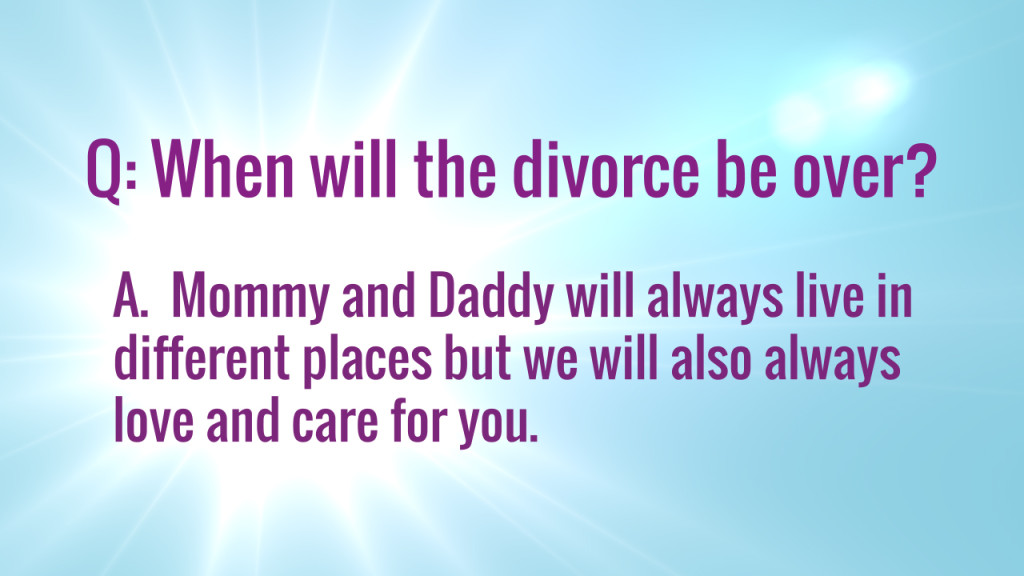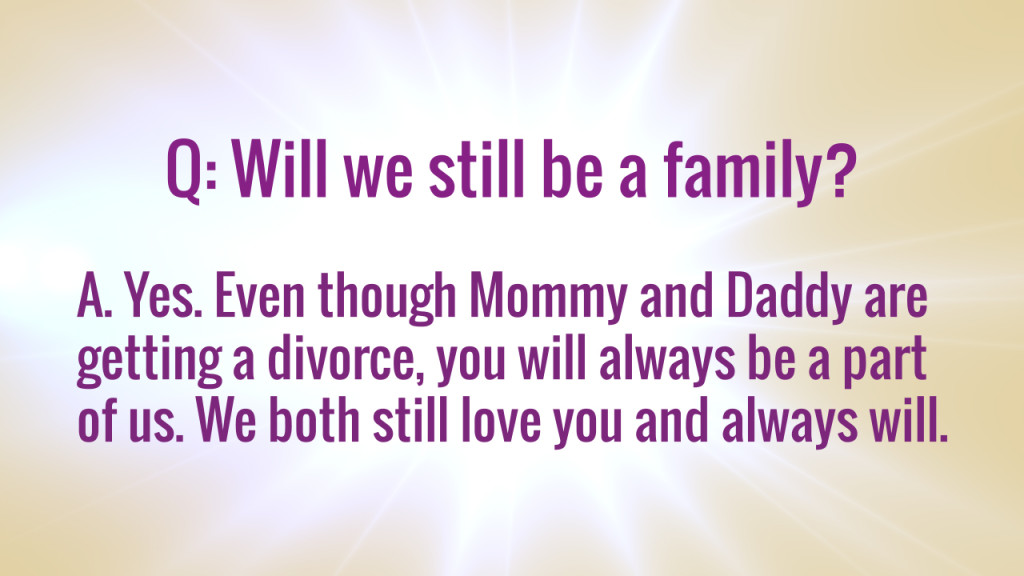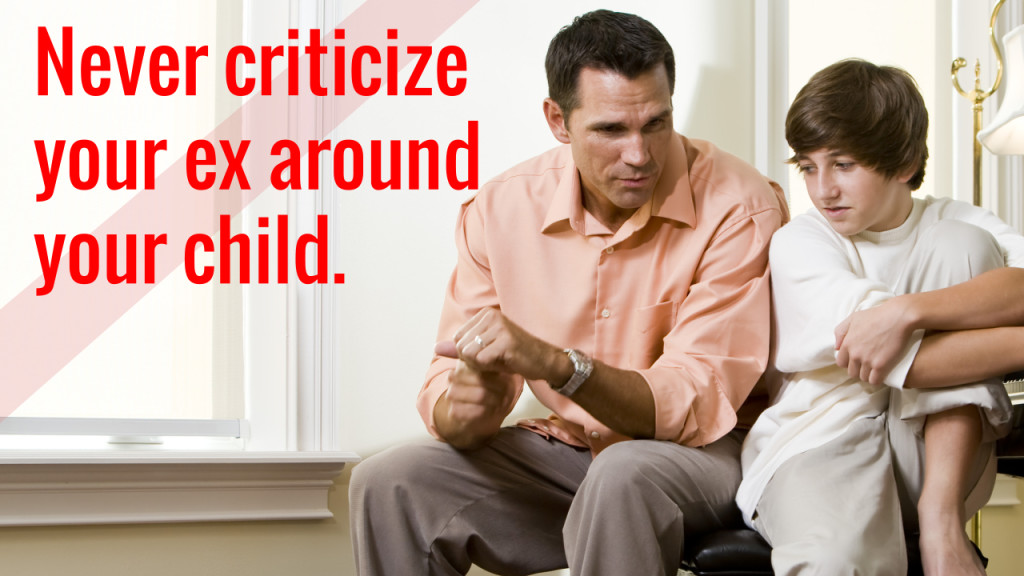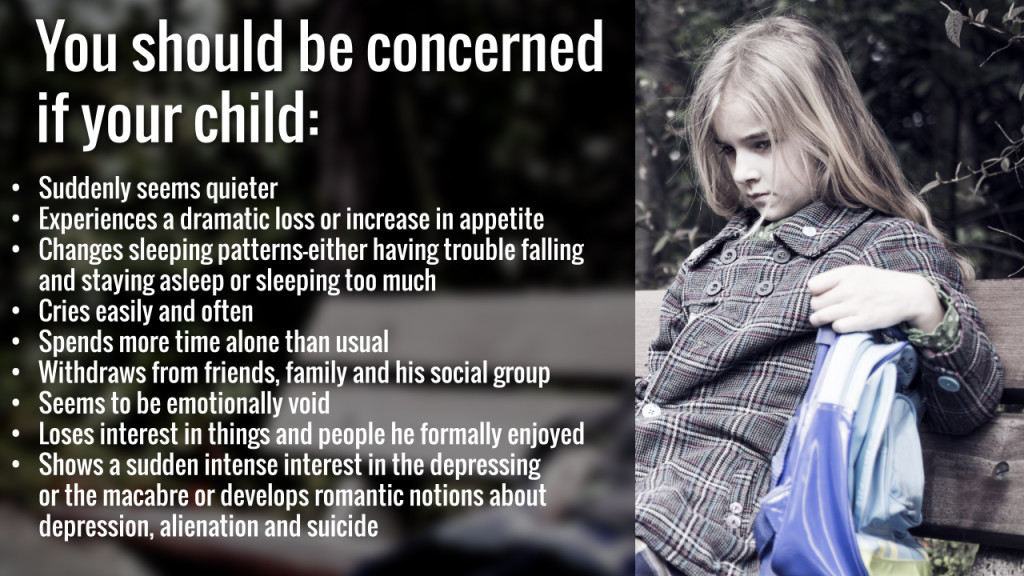The Ultimate Guide To Helping Kids Cope With Divorce
Your divorce is likely to become a defining moment in your child’s life. By carefully navigating the challenges that accompany your divorce, you can set the stage for your child to process the dissolution of your marriage in a healthy manner.
The effects of divorce on children are countless and, sadly, often overlooked while the divorcing parents are absorbed in the emotional and legal challenges that often accompany it. In order to help kids cope with divorce, it’s essential to understand how children experience divorce differently based on their age and stage of life.
Children of all ages need and deserve permission to love both of their parents, despite how their parents may feel about each other. The legal dissolution of the marriage is not an isolated event—it’s a long-term series of gains and losses, breakthroughs and setbacks, calm and crisis. For years after the final decree is signed, divorce will be a factor in your life and your children’s lives. For example, though you may divorce when your daughter is young, your decision to end your marriage will likely impact the seating arrangements at her wedding someday.
To help your children cope with divorce in a healthy manner, it’s important to consider where they are at in the developmental timeline—as each stage is marked with its own set of unique emotional, mental and behavioral characteristics. When you understand where your children fall in the developmental timeline, you’re equipped to provide the support they need as they cope with your divorce.
What To Expect When You Divorce With A Child Age 3 And Younger
The single divorced parent of an infant or toddler has one foot in the wonderland of early childhood and the other in cold reality. Caring for the littlest ones is often an around the clock job—and as a single parent that can be especially overwhelming and isolating. Parents of the very youngest children often make the mistake of assuming their divorce will not impact them. When asked about the impact their divorce has had on their newborn, babies and toddlers, I’ve heard parents say things along the lines of “they’re too young to understand what’s happening,” “they won’t remember” and “they never really got to know their father so they won’t miss him.” Unfortunately, nothing could be further from the truth—there is no such thing as a child who doesn’t know what’s going on—regardless of age. The first two years of a child’s life are filled with critical emotional development phases.
How To Help Your Baby Or Toddler Cope With Your Divorce
- See to it that your child has frequent and regular contact with both of their biological parents.
- 2. Make it easy for your ex-spouse to care for your child if he/she isn’t feeling well—taking the time to identify symptoms to watch for and what to do if this or that occurs. Do not assume they should know or threaten your child’s well-being by withholding information to spite your ex.
- Maintain a calm, positive attitude in the child’s presence.
- Make an agreement with your ex to establish and stick to a normal daily routine
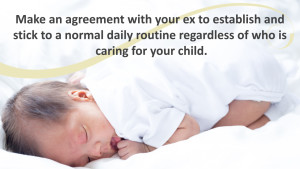 regardless of who is caring for your child.
regardless of who is caring for your child. - Allow your child to tote transitional objects—such a special toys or blankets—between both homes. And if something is left behind, go back and get it. Transitional objects often provide great comfort to a baby or toddler.
- Ensure caregivers respect your child’s wishes, even if they personally don’t agree with them. For example, if your child wants his pacifier but the caregiver is “anti-binky,” make sure your child gets the pacifier anyway.
- Anticipate eating and sleeping problems. These are common ways that babies show stress.
- Pamper and comfort your little one often—it increases your child’s sense of trust in her environment and you.
- Avoid allowing your child to “cry it out.” A child that is allowed to scream in their crib for an hour in the middle of the night can experience even more trauma and distress.
- Maintain your unique relationship with your child. This can include singing special songs, dancing after dinner, sharing secret nonsense words or going to special places.
- If you’re the non-custodial parent, make time to see your baby or toddler often. Very young children have a different sense of time than adults. Whenever possible, arrange to be a part of the daily routine.
- Make your time with your child easy for both of you. Don’t try to cram too much in the time you have together and don’t make your child share you with others during the sacred time you have just for the two of you.
What To Expect When You Divorce With A Child Ages 3-5
A preschooler’s mission is to be independent. Your son is learning how to reason, exercise self-control and to express his emotions verbally. Your daughter’s endless questions about why and how things work or happen open the door for you as a parent to help her expand her language, thinking and decision-making skills. Your son’s self-worth is measured entirely by how you treat him—as he is not capable of believing he deserves great happiness. Meanwhile, your daughter may feel she is not valued because Daddy and Mommy are too busy to play with her.
How To Help Your 3-5 Year Old Cope With Your Divorce
- Make sure your child understands that he/she is not at fault for the divorce.
- Reinforce the fact that nothing your child did, thought, felt or said led to your divorce
- Remind your child he/she is and always will be safe.
- Make it clear that your child will be able to maintain contact with his/her other parent.
- Comfort your child, reminding him/her it is not bad or wrong to feel sad or upset.
- Wrap your arms around your child often, reminding him/her you will always be there.
More likely than not, your child will have lots of questions about what divorce means, why it happens, when it will be over and what your family relationship will be like moving forward. Here’s how to answer those questions:
What To Expect When You Divorce With A Child Ages 6-8
In children’s literature and books on child psychology, six is often depicted as a magical age. At age six, your child is now seeking mastery of an accomplishment on the school playground and anywhere else she is among peers. She is also beginning to judge herself in relation to others.
When children ages 6-8 learn about their parent’s impending divorce they often experience intense sadness. They begin to worry about feeling different from their peers. This is also the age when they first begin to learn how to disguise, hide, or deflect their true feelings. They often feel especially vulnerable and alone because they’re starting to understand they are separate from their parents and when that’s coupled with the understanding that the divorce will separate them even more, it can be overwhelming. Although they may be less likely to ask for it directly, kids this age still need the comfort and reassurance of a warm hug or special quiet time spent alone with a parent.
How To Help Your 6-8 Year Old Cope With Your Divorce
Make sure your 6 to 8-year-old understands:
- He is not at fault for the divorce.
- Nothing he did thought, felt, or said led to the divorce.
- He is and always will be safe.
- He will be able to maintain contact with the other parent (if this is true).
- It is not bad or wrong to feel sad, angry or upset.
- You will always be there for him.
- Many children’s parents’ divorce.
- Many kids wish their parents were together.
- It’s okay and normal to wish that your parents would reconcile but that it won’t
happen because you’ve already tried really hard. - He will always have both parents and remain in touch with his extended family, like grandparents, aunts, uncles and cousins (if this is true).
- You understand and appreciate the changes he’s going through.
- It can be tough getting used to new things and that you will both do whatever you can to help him.
Here are some things you can do to help your child:
- If possible, be sure your child has frequent and regular contact with your ex-spouse.
- Keep a calendar in a common area of your home so your child can see what days he will be spending with your ex.
- Never criticize your ex around your child.
- Make sure your words are consistent with your non-verbal cues. Children this age can be surprisingly sophisticated when it comes to understanding the real meaning behind your words.
- Maintain a calm, positive attitude in your child’s presence.
Ultimately, children depend on and draw from their parents’ happiness and strength. No one can do more to set the desired tone then you can.
What To Expect When You Divorce With A Child Ages 9-12
No longer have dependent but not quite teenagers, children ages 9-12 still deeply valued your opinion, but those of their peers are beginning to vie for dominance. Not only does your pre-adolescent long to be accepted by her friends, she also wants to appear to have her emotions and her life under control. Obviously divorce complicates her ability to do so. You’re probably going to have to do a bit more work than you’re used to doing to earn your child’s respect at this age. Behind that smart mouth is a child that’s just as baffled and bewildered by the changing he’s experiencing as you are. By listening to your child, validating his feelings and empathizing with him, you’ll create a shelter that he will return to as a private magical place where he can share and come to understand you more, too.
How To Help Your 9-12 Year Old Cope With Your Divorce
Divorce can further destabilize an already changing world for a pre-adolescent, which is why your 9-12 year old’s response to divorce will likely differ greatly from those of younger children. You can anticipate your child responding with one or more of the following:
- Anger or ambivalence: 9-12 year old’s typically lean on one side of the emotional spectrum when coping with divorce. They may react with anger because it gives them a sense of control when everything around them seems out of control. Alternatively, they may seem ambivalent and lacking interest. Both responses show the vulnerability in your children and their confusion and uncertainty about the future.
- Rebellion: Your child’s rebellion may or may not be a cause of the divorce since rebellion begins in the pre-adolescent stage. Remember, rebellion is a normal transition towards independence and self-sufficiency.
- Making judgments: Since pre-adolescents understanding exceeds their emotional capacity for dealing with what they experience, they tend to reduce complex issues of divorce down to who is good and who is bad and may choose sides. Listen with understanding and acceptance of your child’s feelings.
It’s important at this age to monitor your child and make sure he or she is not depressed. No child is too young to be depressed and depression commonly shows up for the first time during pre-adolescent years.
What To Expect When You Divorce With A Child Ages 13-17
Studies show only the death of a parent, sibling or close friend is more stressful than separation or divorce. It’s tough being a teenager—you probably remember. Your teen will likely rebel and it will be important for you to try to look at their rebellion in terms of them striking out toward their own lives rather than striking out against you. For most parents, the teen years mark the first time since your child’s birth that they don’t feel needed. Teens want much less of our time, our advice and our companionship. When your teen explores different relationships it’s a lot like window shopping and chances are, they’ll try on different relationships for size before they buy anything. Despite what your teen may say, he/she still needs you—just in a different way.
How To Help Your 13-17 Year Old Cope With Your Divorce
- Open the door to meaningful discussions by considering your teen’s position and why they feel the way they do.
- Remind them of the real consequences of making bad decisions in their pain—not the scare stories.
- Remember when your adolescent blames you they do it as a form of control.
- Invite your teen to draw a picture of his heart—this can help them express what they’re feeling and give you some insight into their struggles.
- Resist the temptation to include your teen in your own problems. Your teen may be acting like an adult rather than a child in many ways, however, they’re growing emotional maturity is not at the level to be able to share deep and painful things from your heart.
Therapists at The Center For Family Unity are trained to help children of all ages cope with divorce and to assist parents in strengthening their bond with their children during this difficult season of life. By investing in children’s therapy, you can make an enormous difference in your child’s well-being—as children’s therapy provides a safe time, place for your child to explore their feelings as well as a trusted person for your child to confide in when it seems like their world is falling apart. Together we can equip your children to find victory in the midst of their pain.
To learn more about how we can help your children cope with divorce we invite you to schedule a free 20 minute consultation by calling us 619-884-0601.





